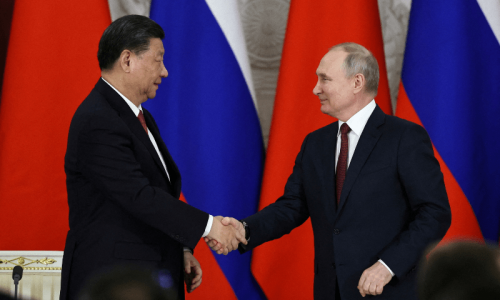LONDON: This is Asia's great year of elections. Taiwan's has already taken place, throwing the country into the worst turmoil for decades; the Philippines, Indonesia and India lie ahead. Altogether, over 1.3 billion people will have had the opportunity to vote. For India, elections are a well-established practice, for Taiwan and the Philippines they are rather more novel, for Indonesia they are an almost entirely new experience.
In its 53- year history of independence, Indonesia has only voted in free elections twice. On Monday it will vote in the country's parliamentary elections. And, as if to make up for the democratic starvation, will vote again in the presidential elections in June.
Indonesia, an archipelago of 13,000 islands and the world's fourth most populous country, is rarely given the attention its size deserves. Its wider influence is dissipated by its own internal complexity. In terms of population, Indonesia may tower over south-east Asia, but this is not matched in terms of its power and authority. Compare this with China, whose size similarly dwarfs north-east Asia, yet whose growing power is rapidly casting a shadow over the entire region. Of course, the two could hardly be more different.
While Indonesia is extremely heterogeneous, China is remarkably homogeneous, dominated as it is by one ethnic group. China is so old no one really knows when it started. Indonesia, in its ethnic and religious diversity, could only be a product of European colonialism.
Virtually every country in the region, bar China, was hit by the Asian financial crisis, but Indonesia suffered most. GDP fell by 20 per cent and tens of millions were thrown out of work. Indonesia's economic travails culminated in a political crisis and the overthrow of President Suharto, who had ruled the country for 32 years with an extraordinary brutality.
Indonesia was borne on a wave of optimism following his fall. For three years, a massive movement of reform - "reformasi" - swept away many of the worst features of Suharto's rule. 1999 saw the first free elections since 1955. Press freedom was introduced, limited decentralisation allowed, East Timor granted independence, and the role of the military restricted. But heady optimism has now given way to a growing sense of uncertainty.
Reformasi has ground to a halt. The political figurehead of the movement, Megawati Sukarnoputri, daughter of Sukarno, Indonesia's charismatic leader and founding father, has now been president for almost three years. Much had been expected of her. She was the leader in waiting. Yet, when she was finally crowned, nothing happened. Reformasi now finds itself rudderless and directionless.
This is not just disappointing; it is dangerous. Indonesia is caught betwixt and between, half-reformed and half-unreformed. Part of the old regime has been dismantled, but the bulk of it remains intact and extremely influential. The military is hugely powerful, even though its wings have been clipped. The judiciary is riddled with corruption.
Suharto is still a free man and, from behind the scenes, is using his vast wealth to pull strings. There is growing nostalgia, especially on Java, for the Suharto era of growth and stability. The threat of an authoritarian backlash and the return of the old regime lurk just beneath the surface.
Indonesia's only previous experience of democracy was under Sukarno, the country's first president, who inspired the independence movement and melded the country together with great skill and vision.-Dawn/The Guardian News Service.











































Dear visitor, the comments section is undergoing an overhaul and will return soon.